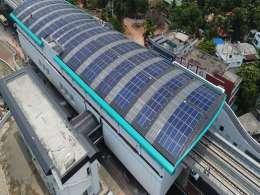If you are a venture capital investor scouting for your next big investment opportunity, it could well be clean energy solutions addressing the bottom of the pyramid (BoP) market.
Venture capital and private equity investors, who bet big on the market size matrix, may find the sheer spread of the Indian clean energy market at the BoP level an attractive option.
According to a study conducted by IFMR Research-Centre For Development Finance in alliance with World Resources Institute, the aggregate potential market for the clean energy sector is pegged at $2.11 billion per year including $2.04 billion for decentralized renewable energy services and $70.1 million for energy products (solar home systems, solar lanterns, and energy-efficient cook stoves).
India’s rural Base of the Pyramid (BoP) consists of 114 million households, which spend Rs 224 billion ($4.86 billion) per year on their energy needs, says a study conducted by the IFMR Research.
These households constitute a significant consumer market for the energy services and products required to provide daily necessities such as cooking and lighting. Despite their low income, these households constitute a significant market for the energy services and products required to provide daily necessities.
Using the most recent available expenditure data (2004/2005), the research report estimates that India’s rural BoP consumers spent $4.86 billion per year on their energy needs.
The research report added that clean energy services and products may require an upfront investment three to ten times greater than that for conventional energy sources such as kerosene and firewood, which often are subsidized or free to India’s rural consumers.
In the clean energy value chain, decentralized renewable energy enterprises, or DREs as they are called, constitute over 95% of the total forecast, said the research report.
DREs supply rural BoP consumers with electricity services generated from renewable sources of energy (primarily small hydro and waste biomass) through existing grids or company-owned distribution systems.
Based on the most recent available data (2004/2005) for expenditure, the report estimated the potential market value of the DRE sector for India’s rural BoP segment at $2.04 bn per year.
Within the energy products, the market size for solar home systems (SHS) or solar-based electricity-generating and storage systems designed to provide power to individual households is estimated at $27.39 million per year. The business model that has typically been prevalent for solar home systems is that of being sold on credit, in partnership with local banks. Users typically pay 10 to 25 % upfront and the rest in installments.
The market for solar lanterns or portable LED lanterns that are powered by solar panels, that can provide light for four to eight hours, is worth $18.58 million per year and the market for energy efficient cook stoves is estimated at $24.13 million, says the report.
Solar Lanterns and efficient cook stoves are sold in bulk to corporate, NGO, and microfinance institution (MFI) partners or sold directly to consumers through local retailers.
While there is a huge market with proven business model, it is also beset with its own challenges. In the DRE space, particularly biomass or small hydro is highly dependent on regulation tariffs set by government and requires negotiation of power purchase agreement (PPA).
Apart from the regulatory challenges, there are other sales affiliated challenges. For instance, for selling solar lanters and cook stoves, government subsidies for kerosene dissuade consumers while charitable distribution schemes distort the local market.
The bottom of pyramid market is not new to the investment fraternity. A host of funds like Acumen, Ennovent Capital and Pierre Omidyar Network are looking at promoting entrepreneurs who advance disruptive innovations for sustainability at the base of the economic pyramid. The investor interest in the space is only set to grow.
“Social investing is definitely witnessing a growing trend. Corporatisation of social projects is giving a new lease to this space,” Raj Kundra, Director of Capital Markets and Energy Portfolio, Acumen Fund, New York, recently told VCCircle in an interview. Acumen Fund has been particularly active in the clean energy space at the BoP.
Some of the investments in clean energy targeting this market include D. Light (a series of Solar LED lights with AC charging options which raised funding from Acumen Fund, DFJ, Nexus Capital and Garage Technology Ventures), SBA Hydro & Renewable Energy (provides hydroelectric power to villages in the Himalayan Belt and raised $1.26 million from Acumen Fund), Husk Power Systems (a technology that converts rice husk into electricity raised monies from DFJ, IFC and Acumen Fund).





